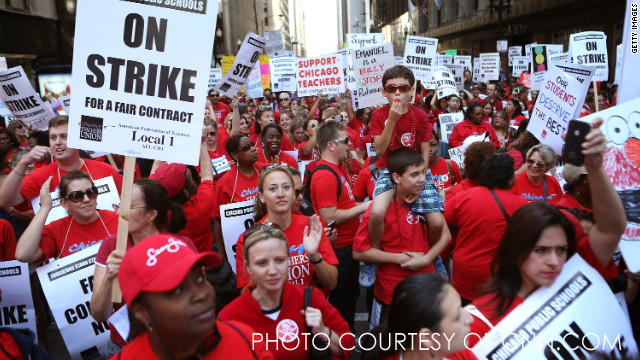
The Chicago Teachers’ Strike asserted itself in history this past month, but could it happen in Wake County?
The Chicago teachers stood up against a number of issues, including longer school days and potential job losses due to new evaluations being tied to student performance.
The evaluation procedures proposed in Chicago are very similar to the evaluations in Wake County, both systems induce evaluations attached to students’ academic performance. Unlike Chicago, though, teachers in North Carolina are prohibited from striking.
Ms. Hamilton, a Special Programs teacher at Leesville, believes the teachers in Chicago stood up for a cause teachers in North Carolina, and across America, are struggling with.
“In North Carolina, we don’t have the power to strike, so [the Chicago teachers] are kind of speaking for us,” said Hamilton.
Along with striking, North Carolina prohibits collective bargaining for public sector employees — i.e. teachers. The ban on collective bargaining, a method of negotiating between employees and employers on a plethora of issues, demonstrates another roadblock for North Carolina workers to make their voices heard.
The repercussions North Carolina teachers face if they were to go on strike like the Chicago Teachers are clear and simple: They can be fired.
But if none of this were true, and teachers could strike in North Carolina, what if the Chicago Teachers’ Strike happened here instead?
If a strike of the same magnitude were to happen at Leesville, Robyn Dennis, sophomore, believes her parents would be incredibly annoyed. Even though Dennis doesn’t necessarily require daycare, other things are at stake.
“[They would] be disappointed that I wouldn’t be getting an education,” said Dennis.
With the block schedule at Leesville, it always seems as though missing one day is equal to missing three — you lose so much time and information. If seven whole days were stripped from the calendar, everyone would be pushed far behind. The days would have to come out of future breaks in the school year, or the school year itself would have to be made longer, pushing exams further into the summer. The chaos resulting from the strike would last long after the strike’s end.
Alli Perrin, sophomore, has two working parents, a brother in third grade, and a brother in ninth grade. If a strike came to Wake County, and pulled her and her siblings out of school, the pandemonium would be great.
“Either my parents would have to take off work, so that they could stay home with [my youngest brother], or my brother or I would have to watch [my youngest brother]…. [The strike] would affect so many more people than anyone realizes,” said Perrin.
Perrin feels it would be incredibly unfair to the families who would be affected, if a strike ever occurred here. Parents would have to scramble to find babysitters and daycares for their younger children, or take off work entirely — both of those options potentially out of parents’ price ranges. All kids would be denied the education they need and deserve for a short period of time, and would, thereby, be thrust behind in their academics.
“It would be unfair to the students who are supposed to be learning, and it would also be unfair to the parents, because a lot of families have parents that work all day,” Perrin said.
Some parents would remain in support of the Union striking, of course, despite the inconveniences it might cause.
Whether or not a strike could ever happen in North Carolina, utter confusion would instill with similar enormity to that of the Chicago Teachers’ Strike. Reactions would vary, but school would certainly be affected for more than the week or so of actual striking.

Leave a Reply